Impact of Flexible Working Practices on Staff Turnover: Aeon Report
VerifiedAdded on 2020/06/04
|15
|2480
|39
Report
AI Summary
This report presents an analysis of flexible working practices (FWP) and their impact on staff turnover within Aeon Company Ltd, a major player in the Japan retail industry. The study investigates the effectiveness of various FWP, including part-time jobs, telecommuting, job sharing, flexitime, and shift work, in reducing employee turnover. The research employs a mixed-methods approach, combining primary data collected through questionnaires administered to 20 managers at Aeon Company Ltd with secondary data from academic literature. The findings reveal that FWP are perceived as crucial for workforce management, with managers acknowledging their positive effects on employee satisfaction, retention, and morale. The study also identifies key benefits of FWP, such as increased workforce retention and reduced absenteeism, while also highlighting challenges like monitoring and supervision issues. The report concludes with recommendations for Aeon Company Ltd to further optimize its FWP to minimize staff turnover and enhance its competitive position. The study also suggests future research directions, including expanding the scope to incorporate other retailers and industries.

Analysis and Present Research
Paraphrase This Document
Need a fresh take? Get an instant paraphrase of this document with our AI Paraphraser
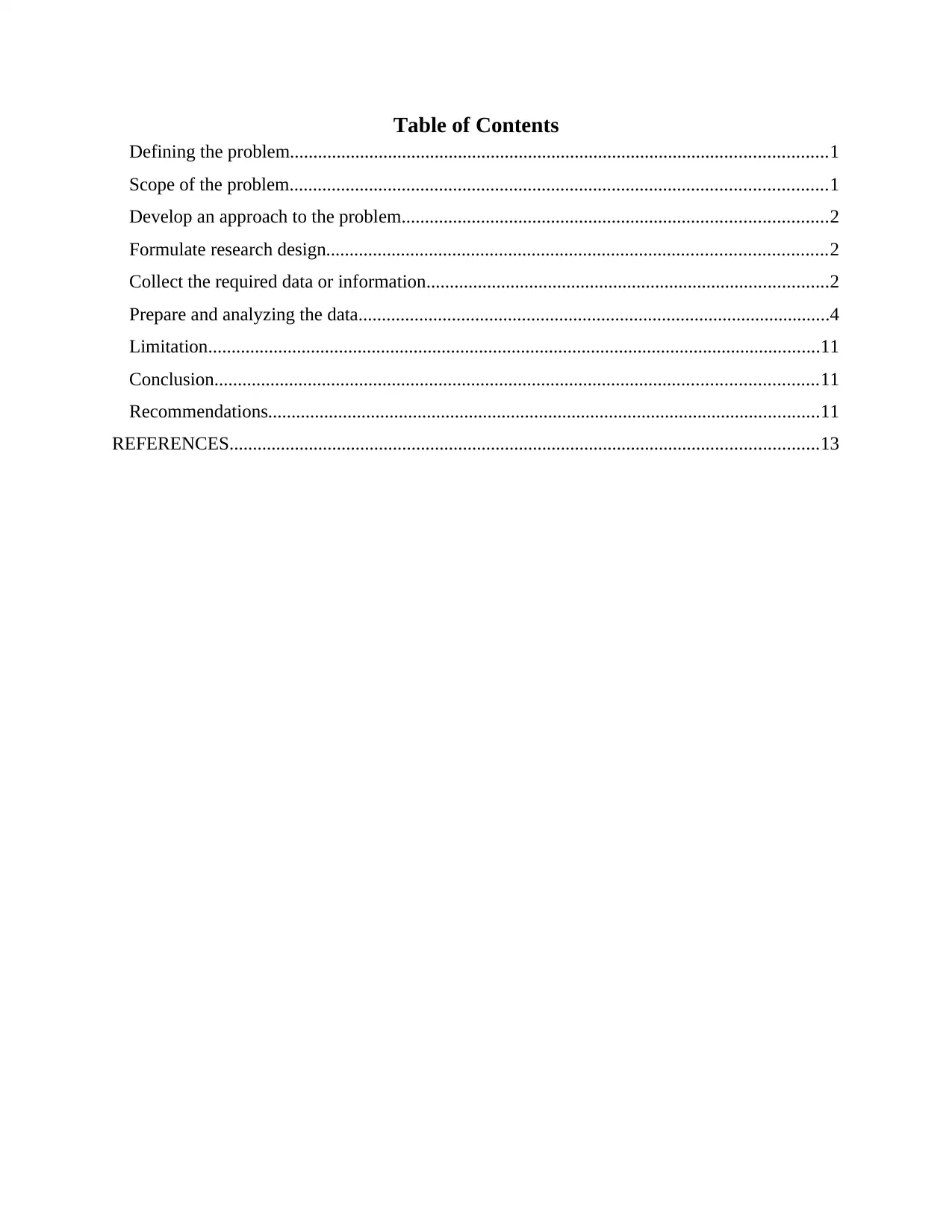
Table of Contents
Defining the problem...................................................................................................................1
Scope of the problem...................................................................................................................1
Develop an approach to the problem...........................................................................................2
Formulate research design...........................................................................................................2
Collect the required data or information......................................................................................2
Prepare and analyzing the data.....................................................................................................4
Limitation...................................................................................................................................11
Conclusion.................................................................................................................................11
Recommendations......................................................................................................................11
REFERENCES..............................................................................................................................13
Defining the problem...................................................................................................................1
Scope of the problem...................................................................................................................1
Develop an approach to the problem...........................................................................................2
Formulate research design...........................................................................................................2
Collect the required data or information......................................................................................2
Prepare and analyzing the data.....................................................................................................4
Limitation...................................................................................................................................11
Conclusion.................................................................................................................................11
Recommendations......................................................................................................................11
REFERENCES..............................................................................................................................13
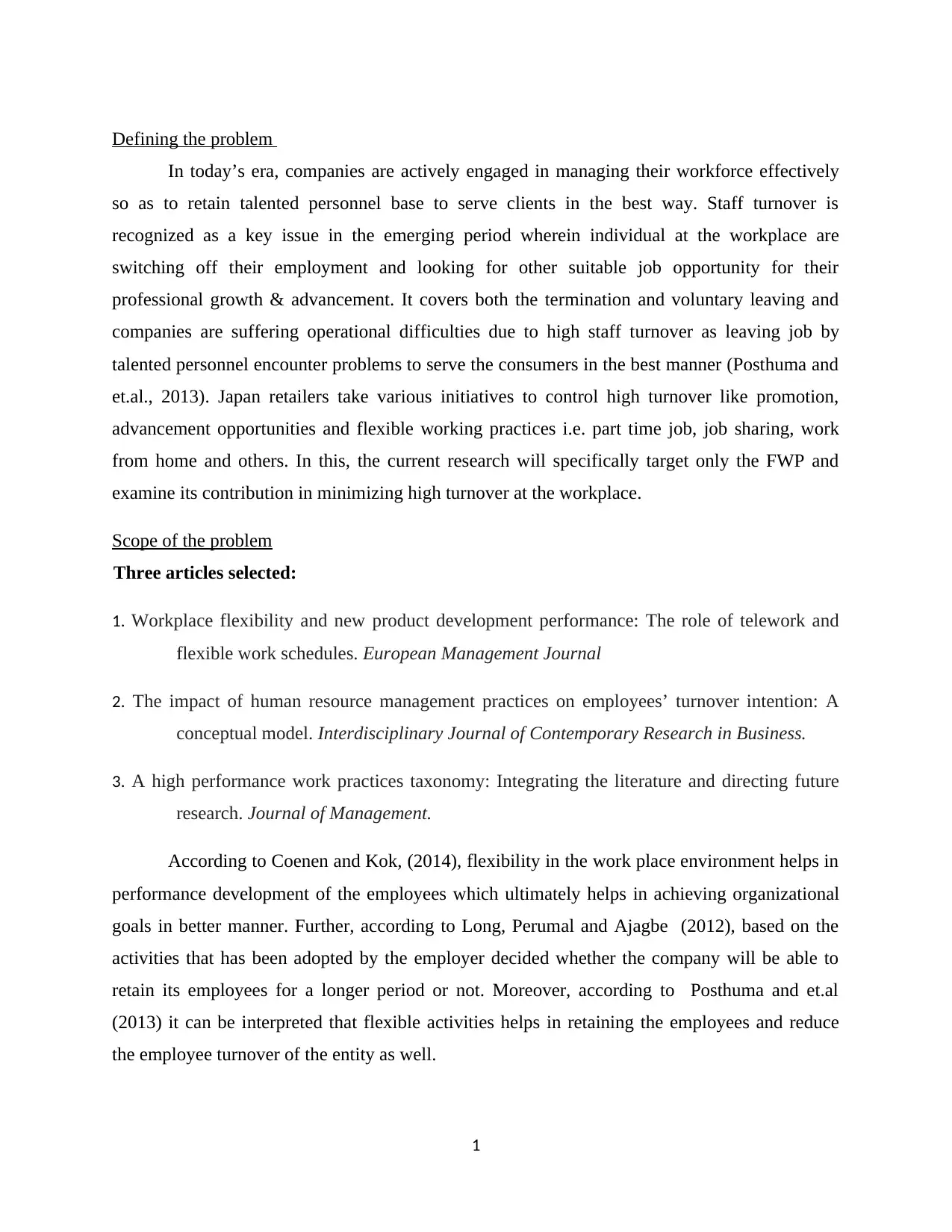
Defining the problem
In today’s era, companies are actively engaged in managing their workforce effectively
so as to retain talented personnel base to serve clients in the best way. Staff turnover is
recognized as a key issue in the emerging period wherein individual at the workplace are
switching off their employment and looking for other suitable job opportunity for their
professional growth & advancement. It covers both the termination and voluntary leaving and
companies are suffering operational difficulties due to high staff turnover as leaving job by
talented personnel encounter problems to serve the consumers in the best manner (Posthuma and
et.al., 2013). Japan retailers take various initiatives to control high turnover like promotion,
advancement opportunities and flexible working practices i.e. part time job, job sharing, work
from home and others. In this, the current research will specifically target only the FWP and
examine its contribution in minimizing high turnover at the workplace.
Scope of the problem
Three articles selected:
1. Workplace flexibility and new product development performance: The role of telework and
flexible work schedules. European Management Journal
2. The impact of human resource management practices on employees’ turnover intention: A
conceptual model. Interdisciplinary Journal of Contemporary Research in Business.
3. A high performance work practices taxonomy: Integrating the literature and directing future
research. Journal of Management.
According to Coenen and Kok, (2014), flexibility in the work place environment helps in
performance development of the employees which ultimately helps in achieving organizational
goals in better manner. Further, according to Long, Perumal and Ajagbe (2012), based on the
activities that has been adopted by the employer decided whether the company will be able to
retain its employees for a longer period or not. Moreover, according to Posthuma and et.al
(2013) it can be interpreted that flexible activities helps in retaining the employees and reduce
the employee turnover of the entity as well.
1
In today’s era, companies are actively engaged in managing their workforce effectively
so as to retain talented personnel base to serve clients in the best way. Staff turnover is
recognized as a key issue in the emerging period wherein individual at the workplace are
switching off their employment and looking for other suitable job opportunity for their
professional growth & advancement. It covers both the termination and voluntary leaving and
companies are suffering operational difficulties due to high staff turnover as leaving job by
talented personnel encounter problems to serve the consumers in the best manner (Posthuma and
et.al., 2013). Japan retailers take various initiatives to control high turnover like promotion,
advancement opportunities and flexible working practices i.e. part time job, job sharing, work
from home and others. In this, the current research will specifically target only the FWP and
examine its contribution in minimizing high turnover at the workplace.
Scope of the problem
Three articles selected:
1. Workplace flexibility and new product development performance: The role of telework and
flexible work schedules. European Management Journal
2. The impact of human resource management practices on employees’ turnover intention: A
conceptual model. Interdisciplinary Journal of Contemporary Research in Business.
3. A high performance work practices taxonomy: Integrating the literature and directing future
research. Journal of Management.
According to Coenen and Kok, (2014), flexibility in the work place environment helps in
performance development of the employees which ultimately helps in achieving organizational
goals in better manner. Further, according to Long, Perumal and Ajagbe (2012), based on the
activities that has been adopted by the employer decided whether the company will be able to
retain its employees for a longer period or not. Moreover, according to Posthuma and et.al
(2013) it can be interpreted that flexible activities helps in retaining the employees and reduce
the employee turnover of the entity as well.
1
⊘ This is a preview!⊘
Do you want full access?
Subscribe today to unlock all pages.

Trusted by 1+ million students worldwide
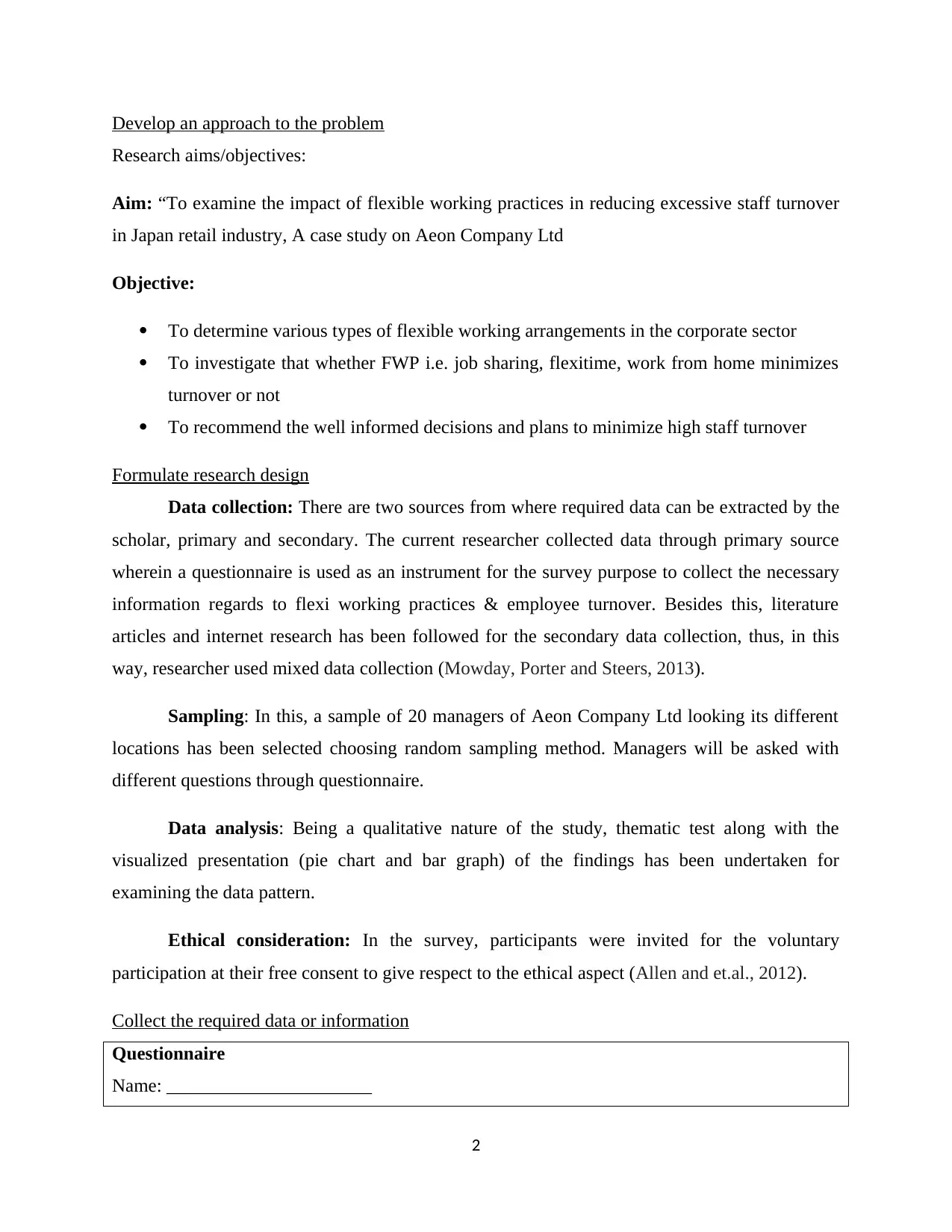
Develop an approach to the problem
Research aims/objectives:
Aim: “To examine the impact of flexible working practices in reducing excessive staff turnover
in Japan retail industry, A case study on Aeon Company Ltd
Objective:
To determine various types of flexible working arrangements in the corporate sector
To investigate that whether FWP i.e. job sharing, flexitime, work from home minimizes
turnover or not
To recommend the well informed decisions and plans to minimize high staff turnover
Formulate research design
Data collection: There are two sources from where required data can be extracted by the
scholar, primary and secondary. The current researcher collected data through primary source
wherein a questionnaire is used as an instrument for the survey purpose to collect the necessary
information regards to flexi working practices & employee turnover. Besides this, literature
articles and internet research has been followed for the secondary data collection, thus, in this
way, researcher used mixed data collection (Mowday, Porter and Steers, 2013).
Sampling: In this, a sample of 20 managers of Aeon Company Ltd looking its different
locations has been selected choosing random sampling method. Managers will be asked with
different questions through questionnaire.
Data analysis: Being a qualitative nature of the study, thematic test along with the
visualized presentation (pie chart and bar graph) of the findings has been undertaken for
examining the data pattern.
Ethical consideration: In the survey, participants were invited for the voluntary
participation at their free consent to give respect to the ethical aspect (Allen and et.al., 2012).
Collect the required data or information
Questionnaire
Name: ______________________
2
Research aims/objectives:
Aim: “To examine the impact of flexible working practices in reducing excessive staff turnover
in Japan retail industry, A case study on Aeon Company Ltd
Objective:
To determine various types of flexible working arrangements in the corporate sector
To investigate that whether FWP i.e. job sharing, flexitime, work from home minimizes
turnover or not
To recommend the well informed decisions and plans to minimize high staff turnover
Formulate research design
Data collection: There are two sources from where required data can be extracted by the
scholar, primary and secondary. The current researcher collected data through primary source
wherein a questionnaire is used as an instrument for the survey purpose to collect the necessary
information regards to flexi working practices & employee turnover. Besides this, literature
articles and internet research has been followed for the secondary data collection, thus, in this
way, researcher used mixed data collection (Mowday, Porter and Steers, 2013).
Sampling: In this, a sample of 20 managers of Aeon Company Ltd looking its different
locations has been selected choosing random sampling method. Managers will be asked with
different questions through questionnaire.
Data analysis: Being a qualitative nature of the study, thematic test along with the
visualized presentation (pie chart and bar graph) of the findings has been undertaken for
examining the data pattern.
Ethical consideration: In the survey, participants were invited for the voluntary
participation at their free consent to give respect to the ethical aspect (Allen and et.al., 2012).
Collect the required data or information
Questionnaire
Name: ______________________
2
Paraphrase This Document
Need a fresh take? Get an instant paraphrase of this document with our AI Paraphraser
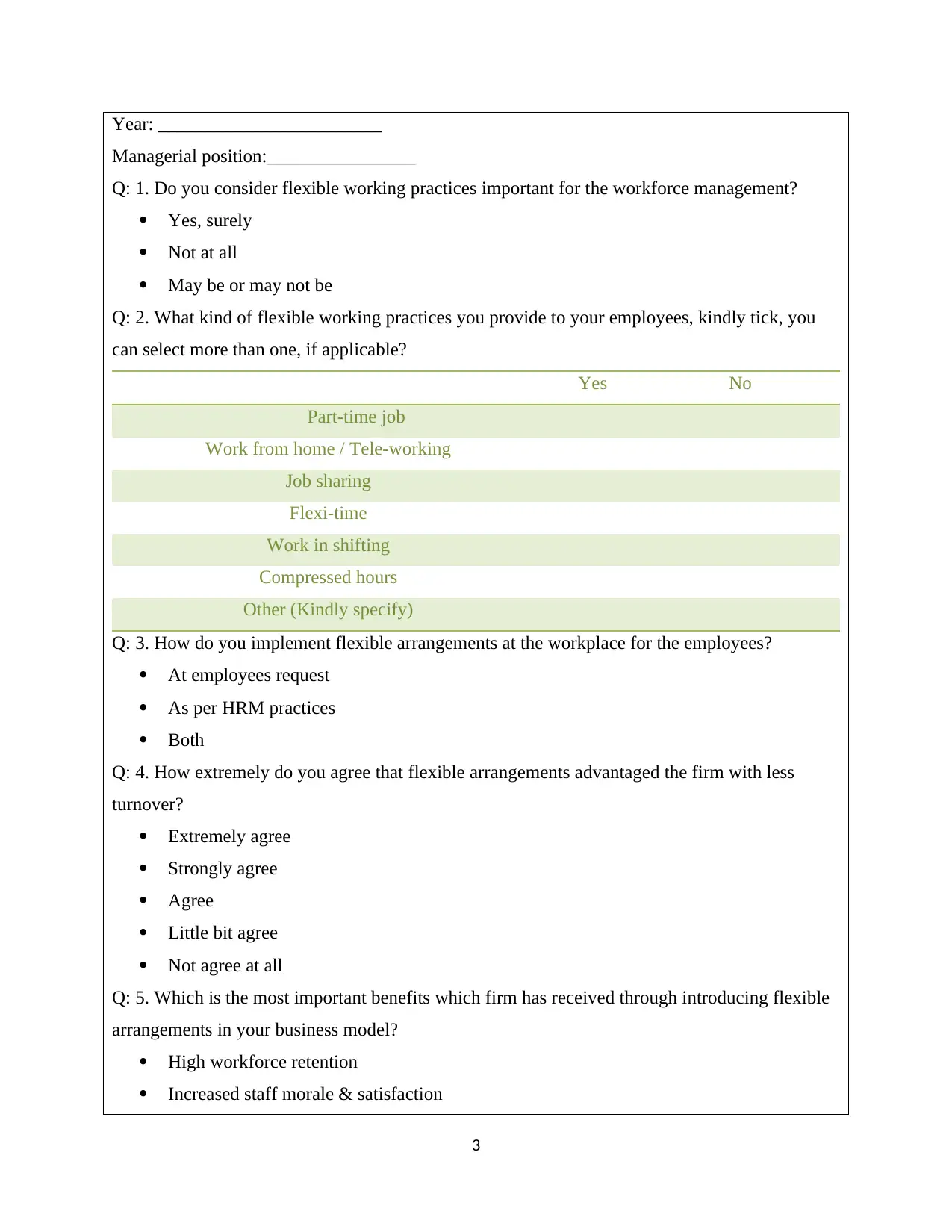
Year: ________________________
Managerial position:________________
Q: 1. Do you consider flexible working practices important for the workforce management?
Yes, surely
Not at all
May be or may not be
Q: 2. What kind of flexible working practices you provide to your employees, kindly tick, you
can select more than one, if applicable?
Yes No
Part-time job
Work from home / Tele-working
Job sharing
Flexi-time
Work in shifting
Compressed hours
Other (Kindly specify)
Q: 3. How do you implement flexible arrangements at the workplace for the employees?
At employees request
As per HRM practices
Both
Q: 4. How extremely do you agree that flexible arrangements advantaged the firm with less
turnover?
Extremely agree
Strongly agree
Agree
Little bit agree
Not agree at all
Q: 5. Which is the most important benefits which firm has received through introducing flexible
arrangements in your business model?
High workforce retention
Increased staff morale & satisfaction
3
Managerial position:________________
Q: 1. Do you consider flexible working practices important for the workforce management?
Yes, surely
Not at all
May be or may not be
Q: 2. What kind of flexible working practices you provide to your employees, kindly tick, you
can select more than one, if applicable?
Yes No
Part-time job
Work from home / Tele-working
Job sharing
Flexi-time
Work in shifting
Compressed hours
Other (Kindly specify)
Q: 3. How do you implement flexible arrangements at the workplace for the employees?
At employees request
As per HRM practices
Both
Q: 4. How extremely do you agree that flexible arrangements advantaged the firm with less
turnover?
Extremely agree
Strongly agree
Agree
Little bit agree
Not agree at all
Q: 5. Which is the most important benefits which firm has received through introducing flexible
arrangements in your business model?
High workforce retention
Increased staff morale & satisfaction
3
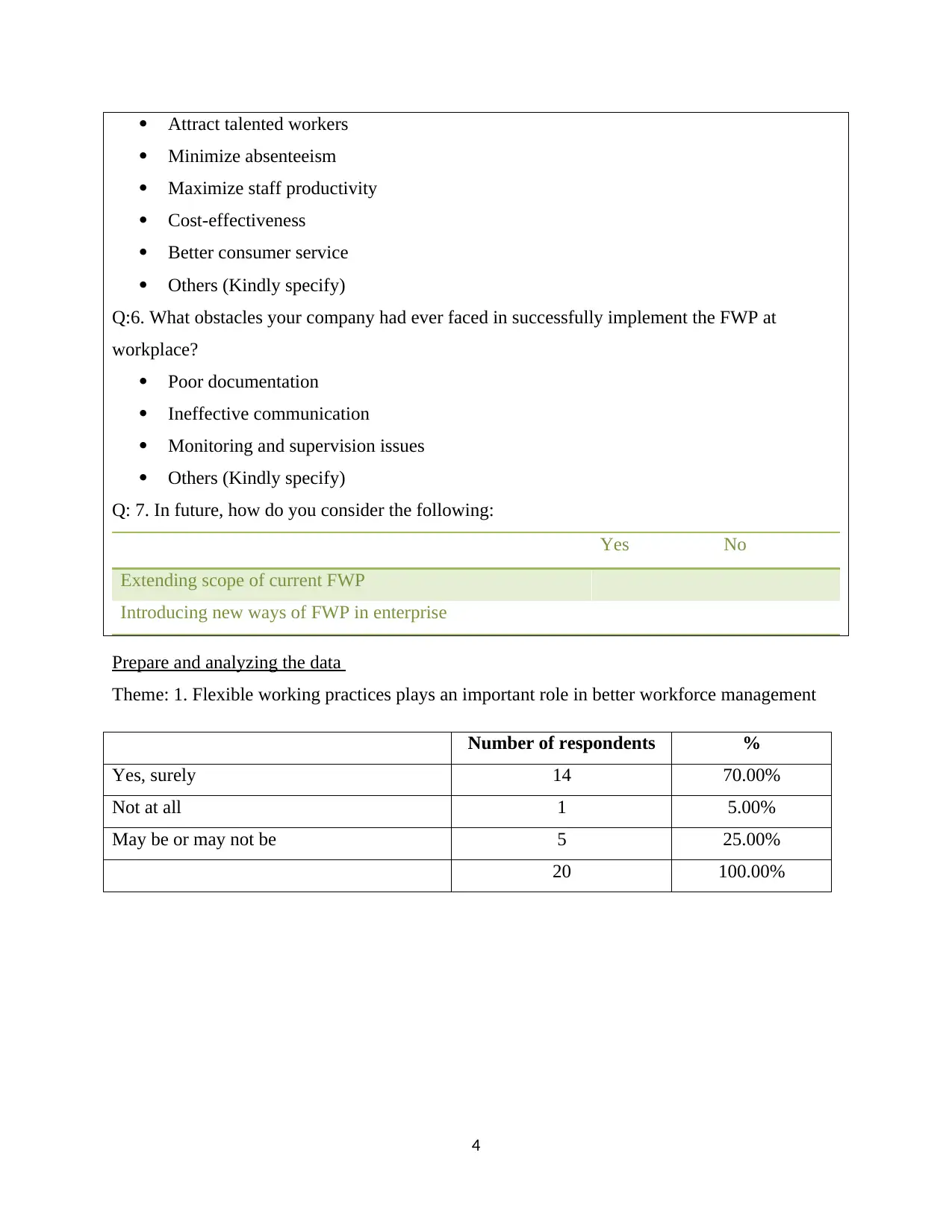
Attract talented workers
Minimize absenteeism
Maximize staff productivity
Cost-effectiveness
Better consumer service
Others (Kindly specify)
Q:6. What obstacles your company had ever faced in successfully implement the FWP at
workplace?
Poor documentation
Ineffective communication
Monitoring and supervision issues
Others (Kindly specify)
Q: 7. In future, how do you consider the following:
Yes No
Extending scope of current FWP
Introducing new ways of FWP in enterprise
Prepare and analyzing the data
Theme: 1. Flexible working practices plays an important role in better workforce management
Number of respondents %
Yes, surely 14 70.00%
Not at all 1 5.00%
May be or may not be 5 25.00%
20 100.00%
4
Minimize absenteeism
Maximize staff productivity
Cost-effectiveness
Better consumer service
Others (Kindly specify)
Q:6. What obstacles your company had ever faced in successfully implement the FWP at
workplace?
Poor documentation
Ineffective communication
Monitoring and supervision issues
Others (Kindly specify)
Q: 7. In future, how do you consider the following:
Yes No
Extending scope of current FWP
Introducing new ways of FWP in enterprise
Prepare and analyzing the data
Theme: 1. Flexible working practices plays an important role in better workforce management
Number of respondents %
Yes, surely 14 70.00%
Not at all 1 5.00%
May be or may not be 5 25.00%
20 100.00%
4
⊘ This is a preview!⊘
Do you want full access?
Subscribe today to unlock all pages.

Trusted by 1+ million students worldwide
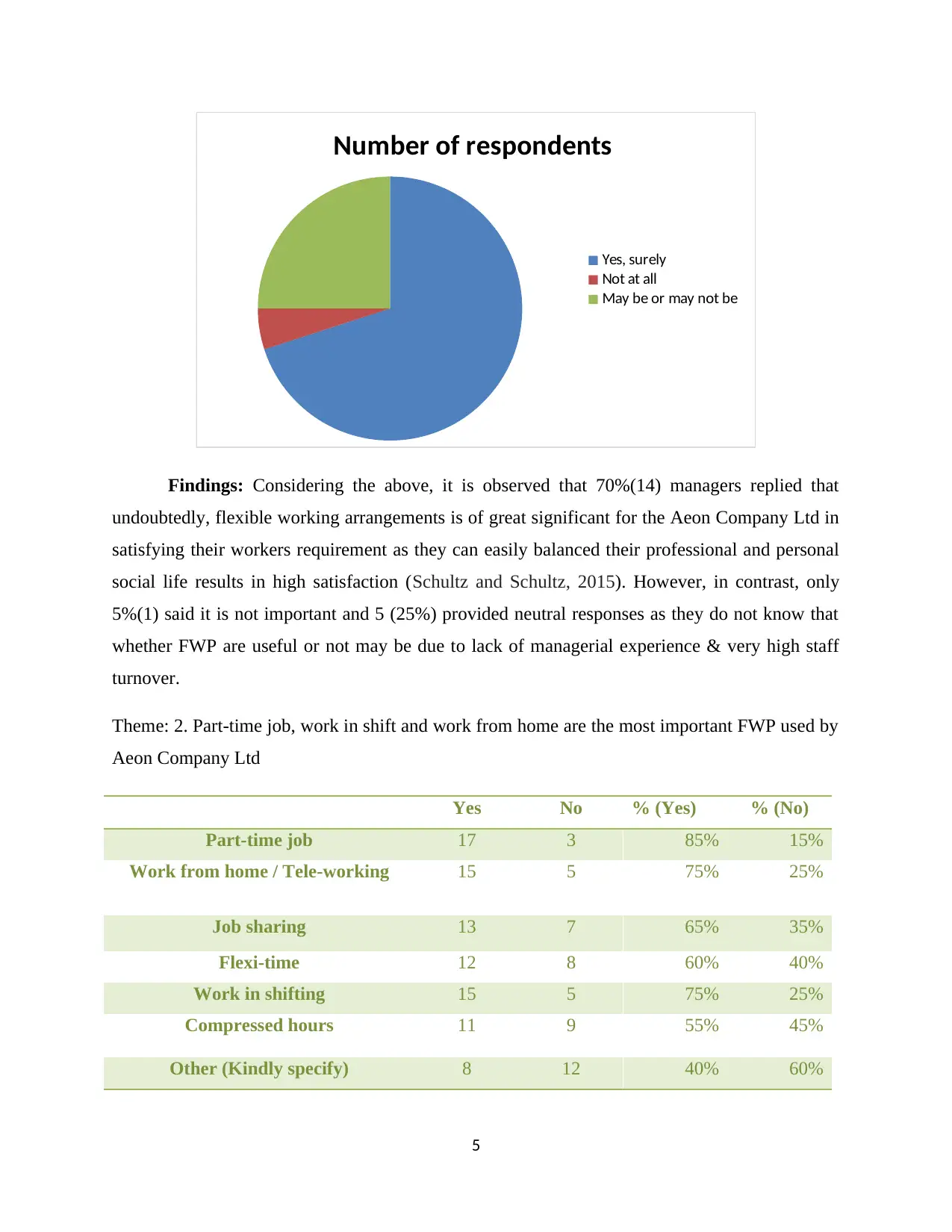
Number of respondents
Yes, surely
Not at all
May be or may not be
Findings: Considering the above, it is observed that 70%(14) managers replied that
undoubtedly, flexible working arrangements is of great significant for the Aeon Company Ltd in
satisfying their workers requirement as they can easily balanced their professional and personal
social life results in high satisfaction (Schultz and Schultz, 2015). However, in contrast, only
5%(1) said it is not important and 5 (25%) provided neutral responses as they do not know that
whether FWP are useful or not may be due to lack of managerial experience & very high staff
turnover.
Theme: 2. Part-time job, work in shift and work from home are the most important FWP used by
Aeon Company Ltd
Yes No % (Yes) % (No)
Part-time job 17 3 85% 15%
Work from home / Tele-working 15 5 75% 25%
Job sharing 13 7 65% 35%
Flexi-time 12 8 60% 40%
Work in shifting 15 5 75% 25%
Compressed hours 11 9 55% 45%
Other (Kindly specify) 8 12 40% 60%
5
Yes, surely
Not at all
May be or may not be
Findings: Considering the above, it is observed that 70%(14) managers replied that
undoubtedly, flexible working arrangements is of great significant for the Aeon Company Ltd in
satisfying their workers requirement as they can easily balanced their professional and personal
social life results in high satisfaction (Schultz and Schultz, 2015). However, in contrast, only
5%(1) said it is not important and 5 (25%) provided neutral responses as they do not know that
whether FWP are useful or not may be due to lack of managerial experience & very high staff
turnover.
Theme: 2. Part-time job, work in shift and work from home are the most important FWP used by
Aeon Company Ltd
Yes No % (Yes) % (No)
Part-time job 17 3 85% 15%
Work from home / Tele-working 15 5 75% 25%
Job sharing 13 7 65% 35%
Flexi-time 12 8 60% 40%
Work in shifting 15 5 75% 25%
Compressed hours 11 9 55% 45%
Other (Kindly specify) 8 12 40% 60%
5
Paraphrase This Document
Need a fresh take? Get an instant paraphrase of this document with our AI Paraphraser
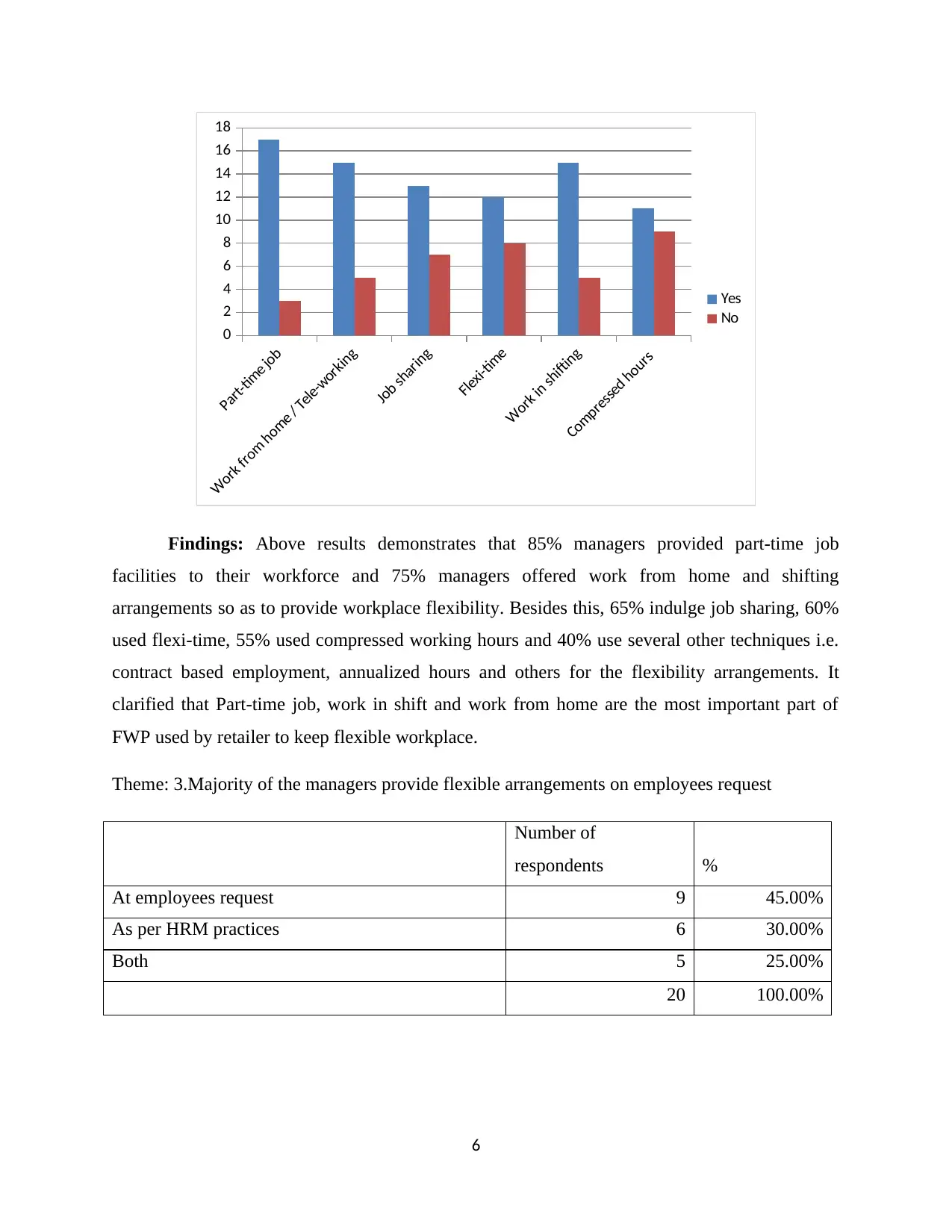
Part-time job
Work from home / Tele-working
Job sharing
Flexi-time
Work in shifting
Compressed hours
0
2
4
6
8
10
12
14
16
18
Yes
No
Findings: Above results demonstrates that 85% managers provided part-time job
facilities to their workforce and 75% managers offered work from home and shifting
arrangements so as to provide workplace flexibility. Besides this, 65% indulge job sharing, 60%
used flexi-time, 55% used compressed working hours and 40% use several other techniques i.e.
contract based employment, annualized hours and others for the flexibility arrangements. It
clarified that Part-time job, work in shift and work from home are the most important part of
FWP used by retailer to keep flexible workplace.
Theme: 3.Majority of the managers provide flexible arrangements on employees request
Number of
respondents %
At employees request 9 45.00%
As per HRM practices 6 30.00%
Both 5 25.00%
20 100.00%
6
Work from home / Tele-working
Job sharing
Flexi-time
Work in shifting
Compressed hours
0
2
4
6
8
10
12
14
16
18
Yes
No
Findings: Above results demonstrates that 85% managers provided part-time job
facilities to their workforce and 75% managers offered work from home and shifting
arrangements so as to provide workplace flexibility. Besides this, 65% indulge job sharing, 60%
used flexi-time, 55% used compressed working hours and 40% use several other techniques i.e.
contract based employment, annualized hours and others for the flexibility arrangements. It
clarified that Part-time job, work in shift and work from home are the most important part of
FWP used by retailer to keep flexible workplace.
Theme: 3.Majority of the managers provide flexible arrangements on employees request
Number of
respondents %
At employees request 9 45.00%
As per HRM practices 6 30.00%
Both 5 25.00%
20 100.00%
6
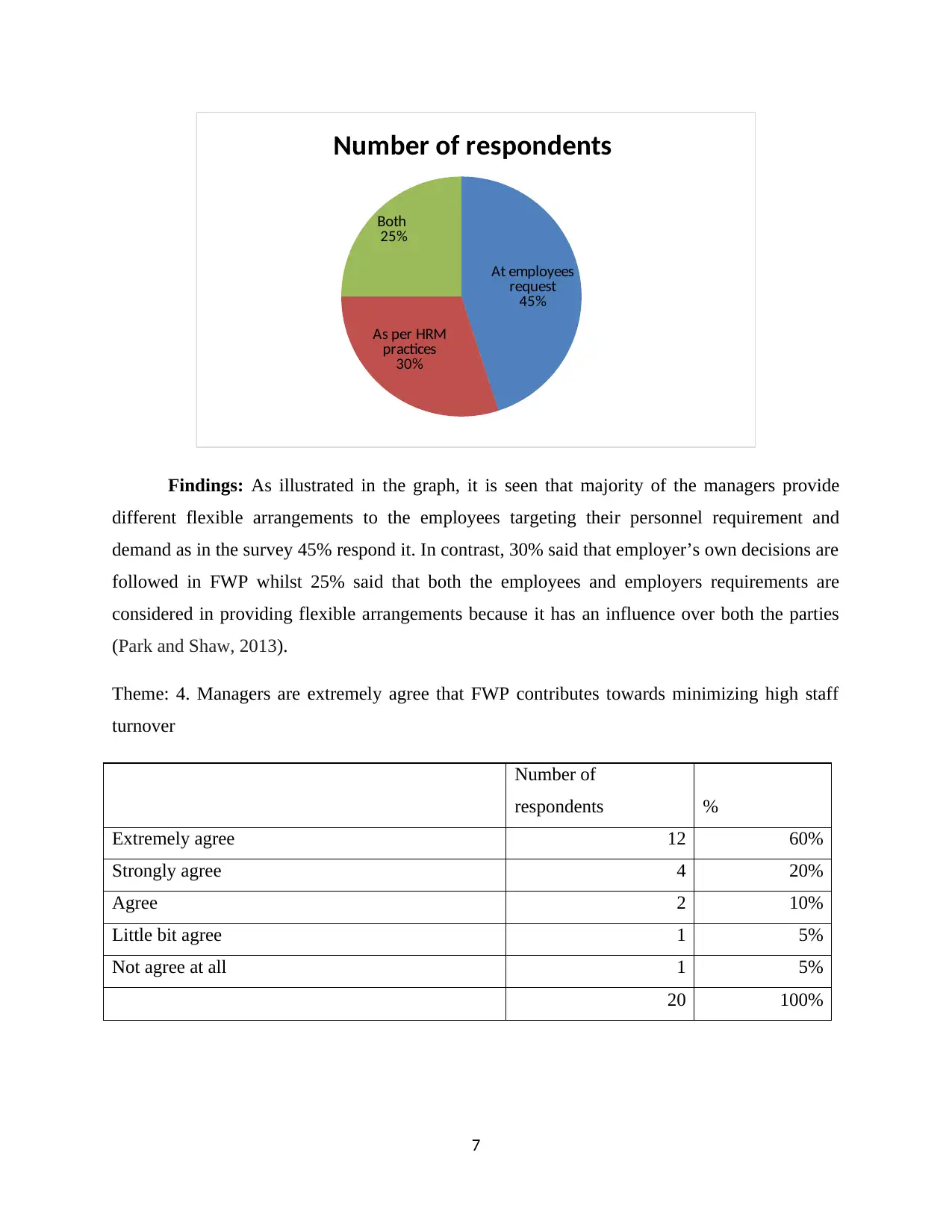
At employees
request
45%
As per HRM
practices
30%
Both
25%
Number of respondents
Findings: As illustrated in the graph, it is seen that majority of the managers provide
different flexible arrangements to the employees targeting their personnel requirement and
demand as in the survey 45% respond it. In contrast, 30% said that employer’s own decisions are
followed in FWP whilst 25% said that both the employees and employers requirements are
considered in providing flexible arrangements because it has an influence over both the parties
(Park and Shaw, 2013).
Theme: 4. Managers are extremely agree that FWP contributes towards minimizing high staff
turnover
Number of
respondents %
Extremely agree 12 60%
Strongly agree 4 20%
Agree 2 10%
Little bit agree 1 5%
Not agree at all 1 5%
20 100%
7
request
45%
As per HRM
practices
30%
Both
25%
Number of respondents
Findings: As illustrated in the graph, it is seen that majority of the managers provide
different flexible arrangements to the employees targeting their personnel requirement and
demand as in the survey 45% respond it. In contrast, 30% said that employer’s own decisions are
followed in FWP whilst 25% said that both the employees and employers requirements are
considered in providing flexible arrangements because it has an influence over both the parties
(Park and Shaw, 2013).
Theme: 4. Managers are extremely agree that FWP contributes towards minimizing high staff
turnover
Number of
respondents %
Extremely agree 12 60%
Strongly agree 4 20%
Agree 2 10%
Little bit agree 1 5%
Not agree at all 1 5%
20 100%
7
⊘ This is a preview!⊘
Do you want full access?
Subscribe today to unlock all pages.

Trusted by 1+ million students worldwide
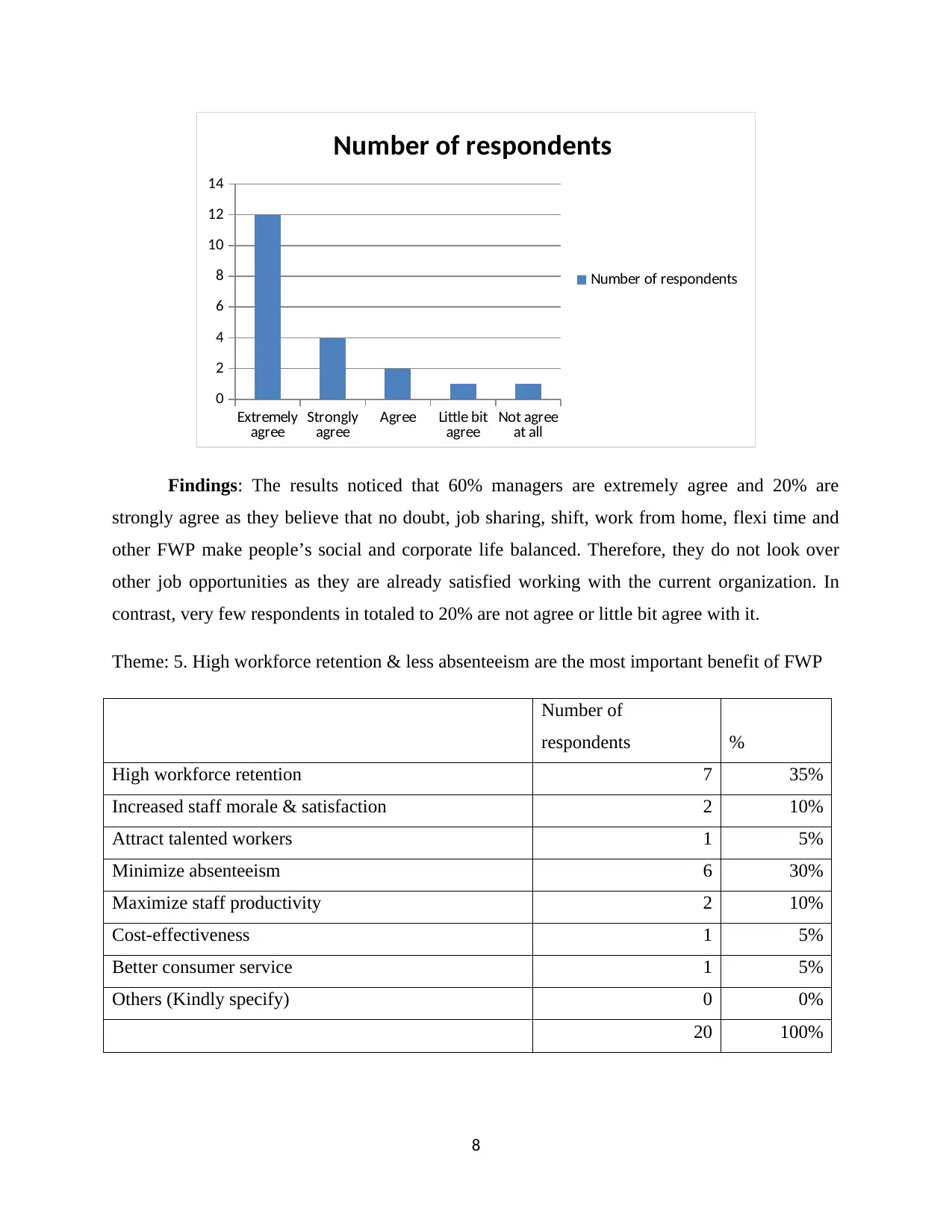
Extremely
agree Strongly
agree Agree Little bit
agree Not agree
at all
0
2
4
6
8
10
12
14
Number of respondents
Number of respondents
Findings: The results noticed that 60% managers are extremely agree and 20% are
strongly agree as they believe that no doubt, job sharing, shift, work from home, flexi time and
other FWP make people’s social and corporate life balanced. Therefore, they do not look over
other job opportunities as they are already satisfied working with the current organization. In
contrast, very few respondents in totaled to 20% are not agree or little bit agree with it.
Theme: 5. High workforce retention & less absenteeism are the most important benefit of FWP
Number of
respondents %
High workforce retention 7 35%
Increased staff morale & satisfaction 2 10%
Attract talented workers 1 5%
Minimize absenteeism 6 30%
Maximize staff productivity 2 10%
Cost-effectiveness 1 5%
Better consumer service 1 5%
Others (Kindly specify) 0 0%
20 100%
8
agree Strongly
agree Agree Little bit
agree Not agree
at all
0
2
4
6
8
10
12
14
Number of respondents
Number of respondents
Findings: The results noticed that 60% managers are extremely agree and 20% are
strongly agree as they believe that no doubt, job sharing, shift, work from home, flexi time and
other FWP make people’s social and corporate life balanced. Therefore, they do not look over
other job opportunities as they are already satisfied working with the current organization. In
contrast, very few respondents in totaled to 20% are not agree or little bit agree with it.
Theme: 5. High workforce retention & less absenteeism are the most important benefit of FWP
Number of
respondents %
High workforce retention 7 35%
Increased staff morale & satisfaction 2 10%
Attract talented workers 1 5%
Minimize absenteeism 6 30%
Maximize staff productivity 2 10%
Cost-effectiveness 1 5%
Better consumer service 1 5%
Others (Kindly specify) 0 0%
20 100%
8
Paraphrase This Document
Need a fresh take? Get an instant paraphrase of this document with our AI Paraphraser
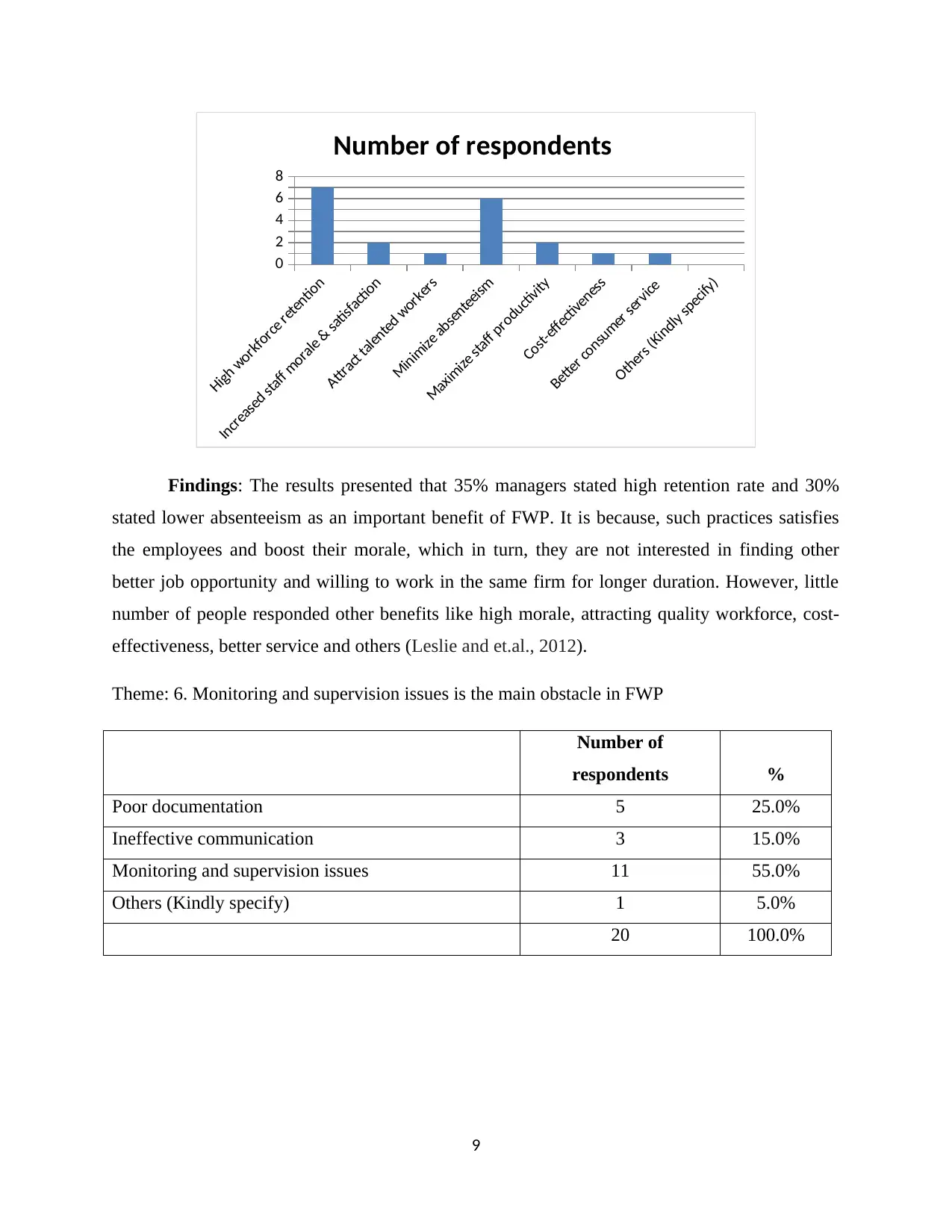
High workforce retention
Increased staff morale & satisfaction
Attract talented workers
Minimize absenteeism
Maximize staff productivity
Cost-effectiveness
Better consumer service
Others (Kindly specify)
0
2
4
6
8
Number of respondents
Findings: The results presented that 35% managers stated high retention rate and 30%
stated lower absenteeism as an important benefit of FWP. It is because, such practices satisfies
the employees and boost their morale, which in turn, they are not interested in finding other
better job opportunity and willing to work in the same firm for longer duration. However, little
number of people responded other benefits like high morale, attracting quality workforce, cost-
effectiveness, better service and others (Leslie and et.al., 2012).
Theme: 6. Monitoring and supervision issues is the main obstacle in FWP
Number of
respondents %
Poor documentation 5 25.0%
Ineffective communication 3 15.0%
Monitoring and supervision issues 11 55.0%
Others (Kindly specify) 1 5.0%
20 100.0%
9
Increased staff morale & satisfaction
Attract talented workers
Minimize absenteeism
Maximize staff productivity
Cost-effectiveness
Better consumer service
Others (Kindly specify)
0
2
4
6
8
Number of respondents
Findings: The results presented that 35% managers stated high retention rate and 30%
stated lower absenteeism as an important benefit of FWP. It is because, such practices satisfies
the employees and boost their morale, which in turn, they are not interested in finding other
better job opportunity and willing to work in the same firm for longer duration. However, little
number of people responded other benefits like high morale, attracting quality workforce, cost-
effectiveness, better service and others (Leslie and et.al., 2012).
Theme: 6. Monitoring and supervision issues is the main obstacle in FWP
Number of
respondents %
Poor documentation 5 25.0%
Ineffective communication 3 15.0%
Monitoring and supervision issues 11 55.0%
Others (Kindly specify) 1 5.0%
20 100.0%
9
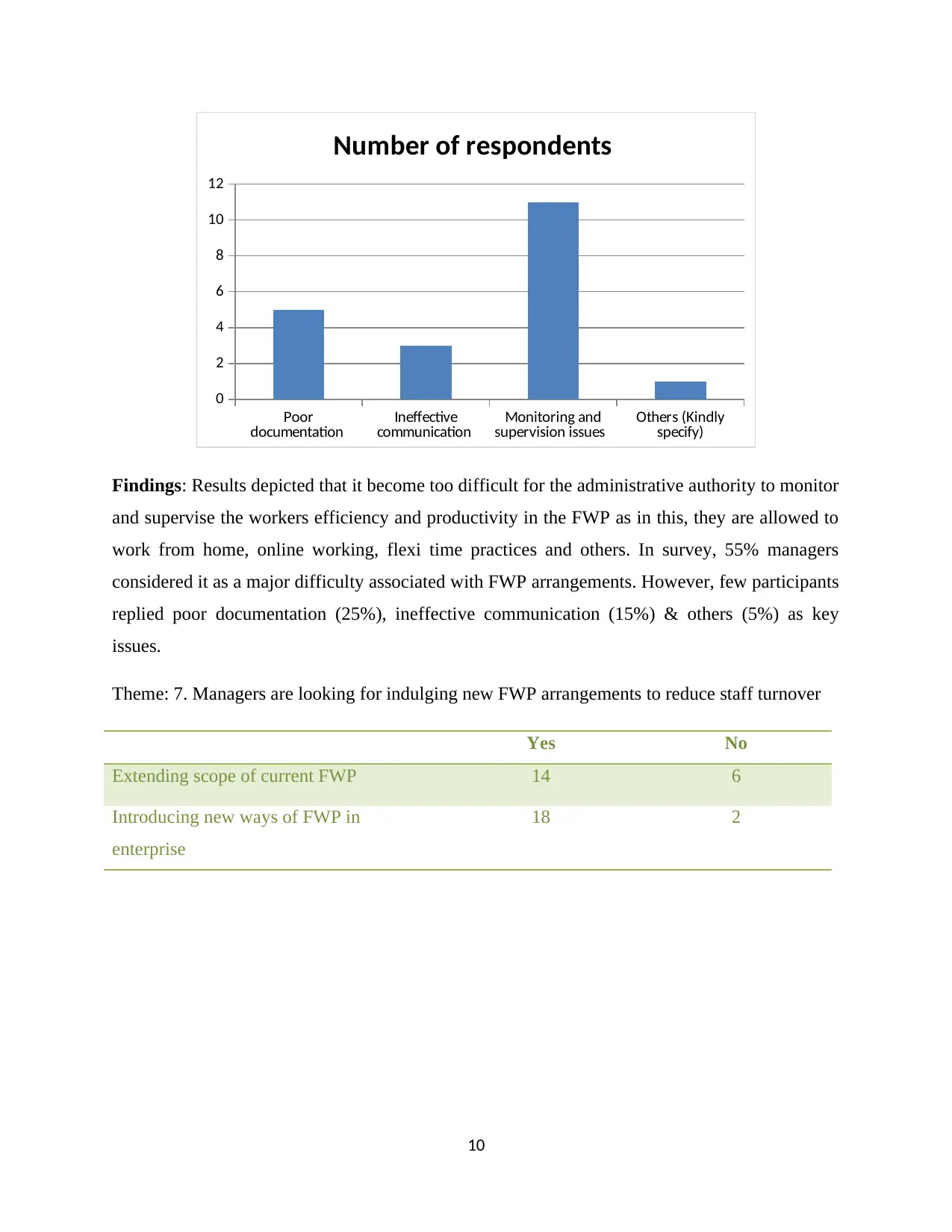
Poor
documentation Ineffective
communication Monitoring and
supervision issues Others (Kindly
specify)
0
2
4
6
8
10
12
Number of respondents
Findings: Results depicted that it become too difficult for the administrative authority to monitor
and supervise the workers efficiency and productivity in the FWP as in this, they are allowed to
work from home, online working, flexi time practices and others. In survey, 55% managers
considered it as a major difficulty associated with FWP arrangements. However, few participants
replied poor documentation (25%), ineffective communication (15%) & others (5%) as key
issues.
Theme: 7. Managers are looking for indulging new FWP arrangements to reduce staff turnover
Yes No
Extending scope of current FWP 14 6
Introducing new ways of FWP in
enterprise
18 2
10
documentation Ineffective
communication Monitoring and
supervision issues Others (Kindly
specify)
0
2
4
6
8
10
12
Number of respondents
Findings: Results depicted that it become too difficult for the administrative authority to monitor
and supervise the workers efficiency and productivity in the FWP as in this, they are allowed to
work from home, online working, flexi time practices and others. In survey, 55% managers
considered it as a major difficulty associated with FWP arrangements. However, few participants
replied poor documentation (25%), ineffective communication (15%) & others (5%) as key
issues.
Theme: 7. Managers are looking for indulging new FWP arrangements to reduce staff turnover
Yes No
Extending scope of current FWP 14 6
Introducing new ways of FWP in
enterprise
18 2
10
⊘ This is a preview!⊘
Do you want full access?
Subscribe today to unlock all pages.

Trusted by 1+ million students worldwide
1 out of 15
Related Documents
Your All-in-One AI-Powered Toolkit for Academic Success.
+13062052269
info@desklib.com
Available 24*7 on WhatsApp / Email
![[object Object]](/_next/static/media/star-bottom.7253800d.svg)
Unlock your academic potential
Copyright © 2020–2026 A2Z Services. All Rights Reserved. Developed and managed by ZUCOL.




